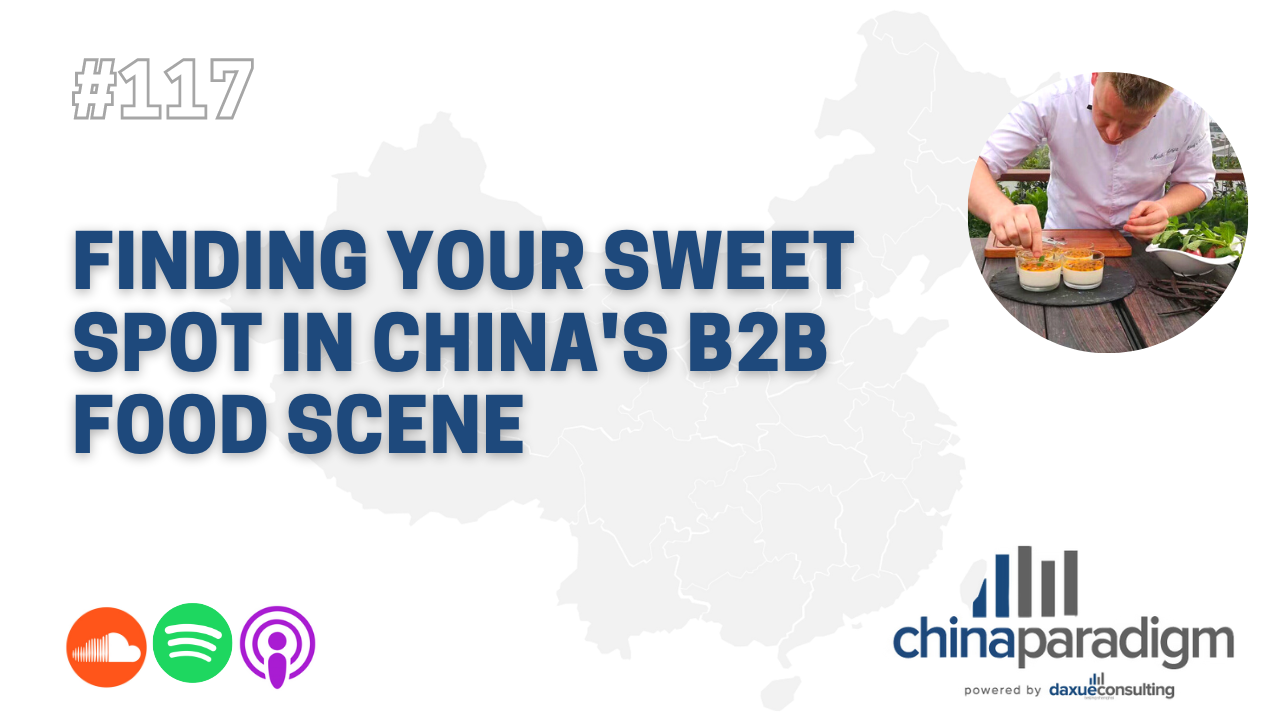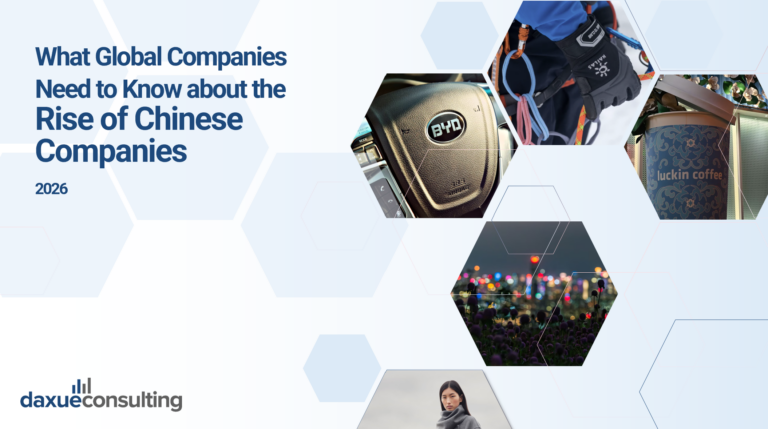Joining us today is Maik Juengst, the founder of Maik’s Gourmet, which is a boutique food business in China based out of Shenzhen.
You have been in China for 7 years, but this is not your first company, Maik’s Gourmet was founded in 2018, but before that, you started a company in Manilla. So, you were already in the food business before setting up your current gourmet food business in China. Right now, you’re providing players in the food industry with products such as duck confit, slow-cooked braised beef, sauces, bases, and side dishes. From your PowerPoint, I understand you are working with a variety of players such as restaurants, cafes, and caterers.
Listen to the full China Paradigm episode 117 on Youtube, Apple Podcast, Spotify, Soundcloud, or Ximalaya.
What is Maik Juengst’s perspective on how the coronavirus outbreak impacted businesses?
First, thanks for the invite, it’s the first time I’ve done this, so I’m excited to share our story. Before the virus, almost every food business in China, including ours, has been impacted negatively. At the time, when everyone had to stay home and nothing was open, we had revenue going from 100 down to less than 10%, so that was a shock. We had to adjust spending in the company straight away because we couldn’t do much in terms of sales because we do more B2B, which was impacted because those businesses had no customers.
We did have lots of time, and we wanted to make use of that so we created a platform for B2C, where customers at home could order our food. Today, and looking to the future, it is probably even better now than before the virus. Because the demand for safe convenient foods, like what we provide, is pretty high at the moment and unlikely to decrease. Also, excluding highly processed convenience food providers, there are not many players in the gourmet food industry in China. Some provide specialist sausages or French dishes like duck confit, but we would rather position ourselves as covering the whole line of B2B and B2C.
Yes, business is better now than it was before coronavirus because of the increased demand for healthy food. I think the gourmet food industry in China is on the way up and will continue to grow.
Are restaurants less affected by the outbreak than hotels?
I think so, the gourmet food industry in China is definitely changing post coronavirus. I originally came from a 5-star hotel with a buffet background. But I’m not sure if the change is totally to do with viruses, maybe more to do with the fact that there are too many 5-star hotels with buffets competing in the market. Maybe after the virus people will be humbler about their spending, so 5-star hotels will struggle, especially those buffet restaurants. Lots are now only doing buffets on the weekend. This is normal in the West because you won’t find that many customers willing to spend 80 USD for a lunch buffet. People want to spend 10-20 USD max and are looking for somewhere quick.
Thankfully for us, we have less of those hotel buffet customers and the one we do have is moving more towards a model more similar to what we’re doing. A faster, convenient service, like a Waga’s, a Starbucks. A good option to get what you need for an acceptable price. Less 1.5-hour lunch buffets basically. I would say my food business in China is like a Starbucks for food, although they have food too, they concentrate on coffee. However, Maik’s Gourmet focuses on the food, so is the opposite of Starbucks in this regard.
How has the coronavirus outbreak changed the way consumers judge how they buy their food?
I feel for a lot of my Chinese B2B customers it’s more about convenience rather than healthy food, so coffee shop owners would rather buy a precooked product rather than prepare it from scratch. It might be safety, labor costs, having a small kitchen, opportunity reasons (a commercial property owner may have extra space in the front of an office and there may be nowhere nearby offering food so they want to turn it into a restaurant). So, using my company you would only need to hire a third of the people and would require a third of the space that a traditional restaurant would need and you can still serve them a decent meal. Plus, there is less of a risk of spoiled products. So, these are just some of the food solutions in China that we provide.
Was the WeChat platform created during the outbreak for B2B clients or for the end client also?
Both, we can sell through an app directly to end-users who want to enjoy our products at home or if you’re a food business in China the chef can just log in to our b2b app. Shuhai Foods manages it, and the chef can order everything he needs and have it delivered within 24 – 48 hours.
Tell us about your food business in China
We started with customers similar to Waga’s looking for decent products which were easy to prepare. They weren’t so readily available here, so what was happening was business owners would come to China and want to create a brand, but they would struggle. They might find the equipment, a good kitchen, and the know-how, but never the whole suite. You might find the right chicken but not the guy who can cook it a certain way, so after opening a few stores, the chicken would taste different store to store. At this stage, I had left the hotel business and was doing some consulting in the gourmet food industry in China.
One day, one of my friends, Matt, who has a food business in China which is basically a restaurant chain with stores doing a DIY pizza concept, said to me, “I wanna open 100 stores, but I’m not interested in going around teaching each chef how to cook pumpkin soup.” This was when I had the bones of the idea already and when I brought my idea up, he liked it. So, he asked me to produce soup elsewhere, freeze it, and ship it to him so it could be reheated and served in his restaurant. This way he could focus on marketing.
Garage kitchen that had a Hai Di Lao factory produce its soups and sauces
Our customer experience, instead of teaching each chef how to roast a pumpkin and he could worry less about having bigger kitchens which would require lots of energy. So, I went back to the drawing board and opened a little garage-kitchen, à la Bill Gates at Microsoft, in a little, unlicensed 40sq meter kitchen. We didn’t pay attention to legal issues at first because we were so small, we just wanted to test demand. It turns out demand was pretty high, and we realized we weren’t professional enough, so we got in touch with people who do that on a professional basis with Chinese food.
We contacted some factories and made some relationships. We found a factory owned by Hai Di Lao, a huge, publicly-traded company and a very well-known hot pot chain in China. The business model for this particular food business in China is having a strong back-end and a strong front-end. Back-end meaning manufacturing and supply chain, where everything is manufactured off-site and can be sent to any of their stores in China.
We basically just walked in and asked if they did western food, and they only did Chinese food. So, we asked them about making some western soups, sauces, and meats in their facility. They agreed. And it’s been a great relationship, because I don’t need to worry about different manufacturers, building guanxi with thousands of different factories, business licenses, etc. They’re covering it all and they have a supply chain network and warehouses so I can have my soups in Beijing Wuhan, Xi’an wherever, and it can be delivered to restaurants in less than 48 hours.
What does Maik’s Gourmet bring to the table in their partnership with Haidilao a very big and famous food business in China?
Well, they were never a client, a few years ago I did some social media videos for them but that was the extent of our relationship. But I contacted them because I had other big customers in the gourmet food industry in China who told me that Hai Di Lao could probably do what I was looking for, and so I met their South China general manager, a Taiwanese, so he had some experience of Western food, and he was very supportive. Now it’s year 2 and despite some initial hiccups, everything has been working fine.
We’re basically an R&D company providing food solutions in China. We do quality control, sales, and marketing. So, we create dishes using their facilities, we do our own R&D in their factory despite them having their own R&D team, they had never focused on western food before. And of course, we bring revenue.
Can you sell anywhere in China or are you still just looking for clients in the Guangdong area?
That’s the main reason we chose Hai Di Lao because they allow us to sell all over China. But there are some things we still have to go elsewhere to produce like sausages and desserts but Hai Di Lao covers everything else. A very big chain like Starbucks, Waga’s, or other huge food business in China would probably have their own R&D chain capable of doing what we do but often they bring us on board because, like Oatley, there may be fan hype around the brand, so branding is important for us.
Click here to find out how daxue consulting can help you with positioning your brand in China
So, what kind of sized food business in China does it make sense for you guys to work with?
It’s up to the owners really, the largest customer we have has 15 stores. Most of our customers are businesses owned by the Chinese. Now, they could cut us off and save some money but I also offer teaching, training, constant updating of the foods, market research, even sometimes going to their businesses and talking with their customers which regular suppliers in the gourmet food industry in China will not do. Our after-sales service is very strong. Also, big businesses might not bother with employing R&D people to come up with something basic like a salad because there are already so many competitors, so it might be worth it for them to just use us.
How does Maik’s Gourmet tackle the issue of inventory for their clients? I understand you provide very safe sourcing and give them marketing advice. But in terms of just having the right amount of inventory how do restaurants and you tackle this issue?
That’s a very important question that every food business in China and indeed around the world faces. Most stores don’t have big freezers to store 20 kilos of a product, so they need more flexible orders. So, we can supply any quantity of product within 24 – 48 hours. So, when you include the expensive, high-quality delivery fee, the more you buy the cheaper the delivery fee will be. Our delivery service will be trucks with freezers that go directly to your business which is the highest quality possible in food safety. We are very flexible in terms of the orders we receive.
As an example of some of the food solutions in China we provide for our clients, if a place can only order small amounts of a certain product per day because they have a small kitchen, we can advise them on what else to buy from us and sell based on their location, competitors, or several people in the area and teach them how to prepare that product, this way the more they buy from us, the cheaper the delivery fee will be, plus they can add new high-quality products to their menus.
For food businesses in China, how hard is it to ensure the quality and safety of the products?
Yes, so we adhere to those standards but actually, most of our customers don’t really care, maybe 80% just buy from us and trust us. The only people who ask about licenses are generally people who have to. I understand if you’re a small business you don’t have the time. But occasionally people will come and inspect our factories but most don’t. Resourcing, we do this with the factory. So over seven years I’ve built up a network of imported raw materials or use local farms and I take care of this myself to ensure quality and also, because of govt. regulations all this info must be tracked.
Regulations in the food business in China are very complicated and change a lot so, thankfully there is a department at the factory that takes care of this. At a certain size of manufacturing, there is a govt. person in the factory of every food business in China at all times to ensure regulations are not violated and fortunately the officials in the factories we work with are highly diligent and good at keeping up with regulation changes and updates because enforcement is very strict in China.
Why is focusing on B2C is not a priority right now?
So, we would like to work with end clients more but it’s more work and requires more time and resources to do social media and to get onto the right sales channels. So, at the moment we just sell the exact same products to end clients as we do to any regular food business in China. It takes lots of marketing dollars and we would be open to selling our products to a company that wants to do this.
In the west, there’s the idea that frozen food is fresher than fresh, or is fresher than a lot of produce you buy at the store which has never been frozen. Is this idea prevalent in China, too?
I think it depends on background/ education. Some people have zero ideas whatsoever about freshness or preservatives but we can explain the flash-freezing techniques we use. But in general, the knowledge situation is improving. And obviously, with B2B, the chef will know these things.
I ask because in the west many businesses use flash-freezing techniques but not so much in China.
Yes, so I think it’s a marketing problem and you’ve got to educate consumers.
Can you tell us about an unexpected success or failure you’ve encountered?
Hmm, unexpected success might be that I found it relatively easy to build good relationships with Chinese staff, Chinese B2B and Chinese B2C here. I always make sure to simply just be nice, honest, and respectful. I got lots of leads by doing this. Working on myself is the best way to build this, being humble, keep working on yourself rather than others. And this will give you opportunities.
Why Shenzhen?
I initially worked at a hotel there and when I left, my network was there. On reflection, I think our business model could have worked even better in Shanghai. There are so much more resources and big contracts to be made here. Scaling would be easier in Shanghai because the HQs of so many Chinese businesses are here.
Listen to the full China Paradigm episode 117 on Youtube, Apple Podcast, Spotify, Soundcloud, or Ximalaya.





